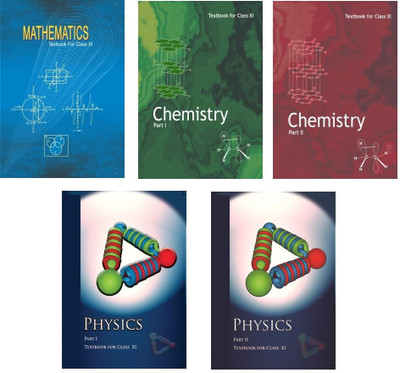NCERT Textbook For Class-XI | Chemistry Part-I, Chemistry Part-II, Physics Part-I, Physics Part-II, Mathematics | (5 Books Set) | Latest Edition(Paper, Ncert)
Quick Overview
Product Price Comparison
The National Curriculum Framework (NCF), 2005, recommends that childrenŌĆÖs lifeat school must be linked to their life outside the school. This principle marks adeparture from the legacy of bookish learning which continues to shape our systemand causes a gap between the school, home and community. The syllabi and textbooksdeveloped on the basis of NCF signify an attempt to implement this basic idea. Theyalso attempt to discourage rote learning and the maintenance of sharp boundariesbetween different subject areas. We hope these measures will take us significantlyfurther in the direction of a child-centred system of education outlined in the NationalPolicy on Education (1986).The success of this effort depends on the steps that school principals andteachers will take to encourage children to reflect on their own learning and topursue imaginative activities and questions. We must recognise that given space,time and freedom, children generate new knowledge by engaging with the informationpassed on to them by adults. Treating the prescribed textbook as the sole basis ofexamination is one of the key reasons why other resources and sites of learning areignored. Inculcating creativity and initiative is possible if we perceive and treatchildren as participants in learning, not as receivers of a fixed body of knowledge.These aims imply considerable change in school routines and mode offunctioning. Flexibility in the daily time-table is as necessary as rigour in implementingthe annual calendar so that the required number of teaching days are actually devotedto teaching. The methods used for teaching and evaluation will also determine howeffective this textbook proves for making childrenŌĆÖs life at school a happy experience,rather than a source of stress or boredom. Syllabus designers have tried to addressthe problem of curricular burden by restructuring and reorienting knowledge atdifferent stages with greater consideration for child psychology and the time availablefor teaching. The textbook attempts to enhance this endeavour by giving higherpriority and space to opportunities for contemplation and wondering, discussion insmall groups, and activities requiring hands-on experience.The National Council of Educational Research and Training (NCERT) appreciatesthe hard work done by the Textbook Development Committee responsible for this


